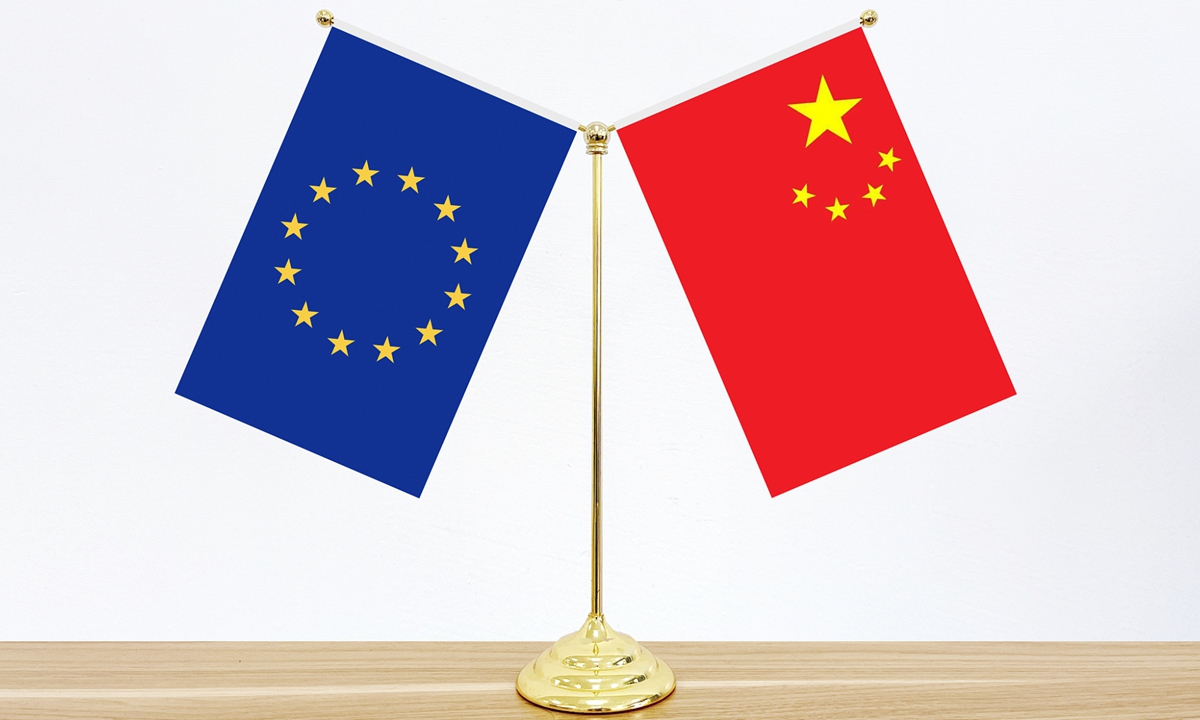
China EU Photo:VCG
While members of the European Parliament (MEPs) participated in a heated debate about how the EU should view and engage with China on Tuesday, European Commission President Ursula von der Leyen urged the bloc to carve out its own distinct European approach and show unity, calling "decoupling with China" not viable.
Experts believe that the EU is now undergoing a period of adjustment to find equilibrium on its China policy but it's unlikely to see a unity due to internal divisions and external factors such as the Ukraine war and US influence.
However, the recent trips of European leaders including von der Leyen and French President Emmanuel Macron to China are helpful for marginalizing some extreme anti-China voices, especially after Macron's calls for the EU to have strategic autonomy and his remarks on the Taiwan question led to a general debate and reflection which encouraged more lawmakers to speak out, experts said.
In her speech at the European Parliament Plenary, von der Leyen first briefed on her trip to China and said that the international and economic status of China, in addition to the EU's own interests, "make it all the more important for Europe to manage its relations with China." This also shows that decoupling is clearly not viable, desirable or even practical for Europe, she noted.
She also underlined the need for EU to "carve out our own distinct European approach" toward China, which was echoed by European Union High Representative Josep Borrell, who called for a united EU approach to China during the Tuesday debate.
"Von der Leyen sent out a message that the EU needs to seek a balance on its China approach, setting up some boundaries for EU-China relations such as no decoupling and ruling out extreme voices," Cui Hongjian, director of the Department of European Studies at the China Institute of International Studies, told the Global Times on Wednesday.
As the European Parliament could not maintain a neutral stance during its debate about China due to sanctions issues, and some anti-China MEPs adopted highly emotional rhetoric when talking about China, taking a position of seeking equilibrium and setting boundary could help find some middle ground amid different views, Cui said.
Some MEPs who have long criticized China for ideological differences and human rights issues continued their rhetoric during the debate and even hyped up China-related matters such as the Taiwan question. Reinhard Bütikofer, who was put on China's tit-for-tat sanctions list against the EU in 2021, said the EU needs to cooperate with "like-minded partners" such as the US and have mutual solidarity "with democracies including Taiwan."
Polish MEP Radoslaw Sikorski, who also chairs the delegation for relations with the US, hyped the Taiwan question by telling China "do not attack Taiwan," and warning China not to supply weapons to Russia.
"It's difficult to coordinate a united approach toward China as some European countries that are close to Ukraine oppose Russia. Driven by ideologies and security concerns, they take a similarly hostile attitude toward China, in addition to the US' heavy influence on Europe's China policies," Wang Yiwei, director of the Institute of International Affairs at the Renmin University of China, told the Global Times.
Some have fallen into the trap set by the US' "democracy versus autocracy" narrative, which puts China and Russia in one camp, and the claim of "today Ukraine, tomorrow Taiwan" still exerts influence on some European officials, Wang said.
Still, Macron's recent comments about Taiwan and his call for European "strategic autonomy" evoked a strong reaction inside the EU. Experts said the comments encouraged politicians who used to be silent on China-related topics due to political correctness to speak out now.
MEP Jan Zahradil, Czech member of the European Conservatives and Reformists (ECR) Group, called for cohabitation rather than confrontation between the EU and China and argued that the EU needs to de-escalate tensions over Taiwan, not escalate them further, as an online video showed.
Manu Pineda, an MEP from Spain, said the EU must be an independent actor in the development of an open and multipolar international order, and in this commitment to the autonomy of the EU in its international policies it is necessary to recover normality in its relations with China, the Xinhua News Agency reported.
"Without Macron's calls, there would have been one-sided voices inside the EU toward China, and now we see this period of adjustment," Cui said.
After the recent visits of European leaders to China reset the all-level exchanges between China and Europe, there might be "a long way to go" for Europe to find a united China policy as it would be easily influenced by factors such as the Ukraine crisis and the role of the US, experts said. But in some areas such as investment, climate and new energy, the two sides should cooperate first by putting aside differences, they noted.
"As long as there is no clear accord inside the EU about its China policy, it's likely we'll see its policy remaining volatile and unstable, and that will last for a while," Cui said.




